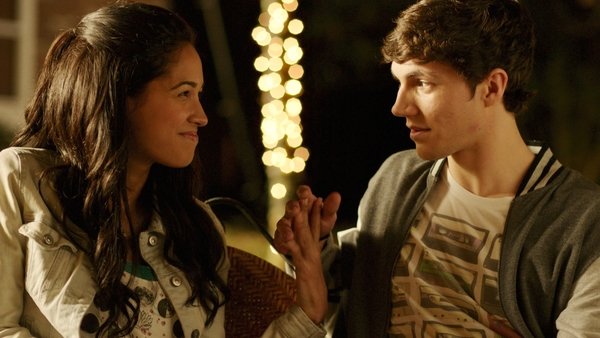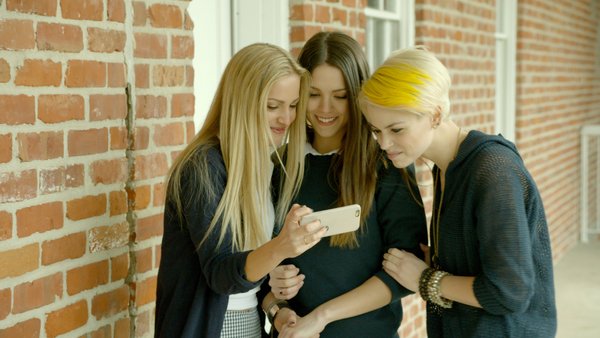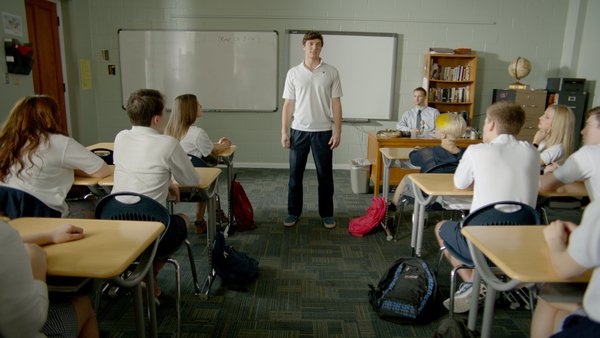Movie Review: “Because of Grácia” Encourages Christian Teens to Find Their Voice

All Images courtesy of Five Stone Films Productions
Disclosure: This post may contain affiliate links, meaning Beautiful Christian Life LLC may get a commission if you decide to make a purchase through its links, at no cost to you.
Spoiler Alert: This review gives away some key plot elements of the movie.
If you’re a Christian teenager or the parent of one, no one needs to tell you how hard it is to live out your faith in a world that is increasingly hostile to Christianity. Some parents try to provide their children with some protection by sending them to a private Christian school, but our sinful natures and the struggles of this world still plague believers wherever they go.
In the 2017 film Because of Grácia, director Tom Simes takes on the challenge of helping Christian teenagers navigate some of the major issues facing high school students today, including intimate relationships, the loss of freedom of speech, and finding the courage to stand up for and live out one’s convictions. The film focuses on two relationships, with the primary one being between not-really-average-but-not-super-confident Chase Morgan (Chris Massoglia), who comes from a Christian family, and a new female student to the school, super-together-and-seems-too-perfect-to-be-real Grácia (Grace) Davis (played by Moriah Peters, who auditioned for American Idol in 2010).
Chase, an “undercover Christian” who is not vocal about his beliefs, is immediately smitten upon seeing Grace for the first time at the start of the new school year. His childhood friend, O.B. (Brett Simes), is the dream friend of every high schooler, giving Chase (and movie watchers) comedic relief, as well as a listening ear and practical perspective on taking the normal trials and tribulations of male adolescence in stride. In fact, Massoglia gives such a realistic and endearing performance portraying high school male angst that my husband had flashbacks to his own teen years while watching the scene where Chase tries to muster up the courage to call Grace.
The other relationship plotline of the movie involves a pastor’s daughter, Bobbi Ryan (Rachel Hayward), and Jessie Valentine (Jesse Froese). Jessie is pressuring Bobbi to have sex because 1) he wants to have sex, and 2) he sees sexual intimacy as a way to express his love for Bobbi. Yet, Bobbi has significant doubts about taking their relationship that far.

At first glance it seems like the film is overly ambitious in addressing such a wide range of issues facing Christian teens today, including pre-marital sex, the competing theories of Darwinism and intelligent design, and surviving high school with one’s faith intact in the midst of students and teachers who range from kind and sympathetic to petty, mean, and even downright hostile. Yet, somehow Simes manages to engage with them all quite deftly.
A debate class provides the opportunity for Grace to share solid information about the scientific evidence for intelligent design, as well as the problems with Darwinism. These interactions also give us appreciation for everyone’s right to express their views without fear. In one debate, Grace expresses her exasperation to the class and her atheist teacher, Mr. Livingston (Owen Presland-White):
It feels like every time I speak about creation in this way at school, I’m either shut down, laughed at, or both. What about open-minded dialogue, what about the pursuit of truth? Abraham Lincoln said that “those who deny freedom to others deserve it not for themselves, and under a just God can no longer retain it.” It seems like there’s only one worldview promoted at this school, and it doesn’t include the G-factor.
Simes hits a home run in the casting of all the main characters. Peters (Grace) remarks in an insider video on the film about how her own life has so many parallels to the character she portrays. Her winsome and endearing portrayal depicts Grace at first glance as the more mature Christian who has to help the fumbling Chase find his way, but it turns out not everything is quite as it appears. And I was thankful for that, because we don’t need another cliché Christian movie that checks all the stereotype boxes without touching our hearts with the realness of God’s grace in the midst of a very confusing and hostile world.

The theme of courtship versus dating is present in the film but not in an overpowering way. Grace has not come to her view of wanting friendship before dating in a relationship without some real-life experience in her past that brings her to this point. While we learn from the Grácia insider interview that Simes personally favors courtship, his position seems to be not so much a legalist view against dating but rather a response to the easy hookup culture that pervades the teen scene today. After all, sex is for marriage and marriage is for life, so it’s a good idea to find a spouse who respects you and is also your best friend. And Grace herself responds to Chase that he shouldn’t so easily believe her precocious little brother’s claim that she is a courtship-only woman.
Temptations always seem to find us when we are at our weakest points, especially in the area of sexual temptation. Bobbi eventually gives in to Jessie’s advances along with all the pain, shame, and hard decisions that go along with compromise.
The themes of the movie could be described as cliché, but the truth is that high school students, including Christians, do face tremendous peer pressure to have sex, hide their Christian beliefs, and blend in with the consensus view. Now more than ever, anyone holding an unpopular view in today’s culture could be labeled as hateful in some way. It is a scary world to hold to convictions that don’t agree with whatever culture labels as good, or things toward which we should at least be tolerant.

I probably shouldn’t expect more out of a film that is already taking on so much, but it would have been good to see the local church more involved in the lives of the Christian students in Because of Grácia. The only Christian influences we see are friends, a believing teacher named Mr. Brady (Ben Davies) who is persecuted for his faith, and the students’ Christian parents. Bobbi’s dad is a pastor who is stereotypically depicted as being so distracted with budget issues and difficult staff that he is having trouble focusing on his daughter and her struggles. It is simply enough for the students and adults to believe in Christ and try to be a good person; if you mess up, God’s grace is waiting there for you as you live out the Christian life.
And that is true, but there is so much richness in the doctrines of redemption in Christ and new life by the regenerating work of the Holy Spirit that is missing in many believers’ knowledge of the Christian faith today. If high school students better understood core biblical teaching, being faithfully discipled by the pastors and elders of their local churches, they would have a stronger theological grounding to stand upon when facing the tough trials of high school and the years to come.
It was heartening to see the Christian fellowship between the students in the film as they supported each other in following Christ—and without condemning them for their shortcomings. Their mutual support and encouragement eventually lead to Chase finding his voice and Bobbi finding much needed courage.

In a rap song Chase performs in one of his classes, he points to his hope in Christ alone:
See, I believe Jesus is the greatest man whoever lived.
Because when my depression was choking me,
Ghandi was not the one to show me love when I was drowning in my own imperfections.
It was Jesus that brought me up out of that pit.
See, I knew what brokenness sounded like to the hopeless.
It sounded like a piano with all of its strings that were ripped right out of it,
Still looking perfect on the outside to its admirers,
But knowing the sound of its music would never measure up to the symphony of perfection.
But that’s when this carpenter named Jesus came into my life,
And took this dead heart and nature and made it so much more alive.
And this strength Chase finds to publicly confess his faith comes, at least in part, from his relationship with Grace and seeing her courage of conviction. The Bible tells us in Ecclesiastes 4:12,
And though a man might prevail against one who is alone, two will withstand him—a threefold cord is not quickly broken.
And in 1 Thessalonians 5:11,
Therefore encourage one another and build one another up, just as you are doing.
In a world where tearing each other down is becoming the norm, believers especially need their brothers and sisters in Christ to support them in the midst of a culture that hates so many of their values, which are already a struggle to uphold in increasingly secularized churches.
My first thought after watching the end scene of Because of Grácia was to encourage my adult children to watch it, even though they are far beyond the high school years. Wherever we find ourselves living out our various vocations in this world, we all need to hold fast to our faith and to delight in our duties as God’s children. We also need to be courageous in sharing the great truths of the gospel, and we need to have grace for others—as well as ourselves—knowing that God in Christ Jesus has forgiven us. And, as Because of Grácia so beautifully shows us, we are meant to travel these challenging roads together.

Are you a pastor or youth group leader? If so, be sure to check out this link to access the “Because of Grácia” movie for group viewing along with helpful conversation and leader’s guides. “Because of Grácia” is also available on DVD, Amazon Prime Video, and other platforms.
Related Articles:
- “American Gospel: Christ Alone” Film Exposes False Teachings of the Prosperity Gospel Movement
- 10 Films with a Christian Perspective
- Learning to Respect Your Enemies—the Western “Hostiles”
- Hollywood and Christianity
- The Love of Money versus “Godliness with Contentment”: 10 Movies about Wealth and Greed

